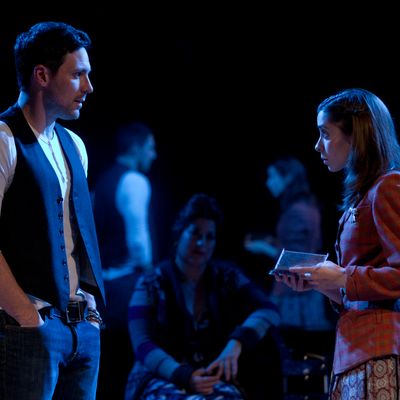
There’s much to love (along with a few choices that mystify me) in Once, a sweet mash of tuneful, youthful, beautiful blarney that’s successfully leapt from screen to stage. (And next, to Broadway.) The adored 2006 indie film on which it’s based — with its super-simple, barely there story about a heartbroken Dublin busker played by Glen Hansard, front man of the Frames, and a wistful Czech flower seller played by Hansard’s then-bandmate/then-lover Marketa Irglova — was all about the dewy joy of falling in love, making beautiful music together, and then having the good sense to end the affair (and the film) before reality set in. Shot guerrilla-style with no frills or folderol, with Hansard-and-Irglova’s program of cascading three-hanky folk ballads as its backbone and raison d’etre, Once was, more or less, the world’s first mumblecore movie-musical. (“Falling Slowly” won an Oscar, surfaced on American Idol, and then insinuated itself into your local Starbucks’ morning mix.) The film avoided both camp and music-video flash with a just-jammin’-here, docu-casual style and strictly diagetic music. It isn’t a “movie-musical” at all, fans can claim: It’s a movie about music and musicians, playing themselves, alongside other non-actors, improvising dialogue; plus, this folk fairy tale really kinda sorta actually happened. But can such strategically unstaged magic be recaptured on a stage? Of course not.
Luckily, the adapters of Once haven’t tried, opting instead to generate their own magic, on their own terms. Director John Tiffany and choreographer Steven Hoggett (the air-bending dream team behind Black Watch) affix a meta-theatrical capo to the story at the outset: They set it in a working tavern — open to the audience before the show and during intermission — where spirits are served, and lifted. The acting ensemble consists of supremely talented musicians who are also polished, professional actors; they phase in and out of scenes and songs, instruments always at the ready. Scenes around Dublin are sculpted out of the jam session with light and movement. Vigorous movement, too. The composers, with a lift from music supervisor Martin Lowe, have injected elements of rhythmic Irish dance into the incidental score, which Hoggett uses as a springboard to get his performers airborne. Anyone who’s ever played a musical instrument will appreciate the focus and control on display here. It’s no small thing to stay flawlessly on pitch in mid-leap, especially, I’d imagine, if you’re on fiddle or cello; yet Elizabeth A. Davis, David Abeles, Andy Taylor, and the rest of the supporting cast do just that, again and again. Hoggett is a kind of mesmerist. His sense of the physical comes from some distinctly metaphysical plane. He and Tiffany interpret the dreamy and destabilizing effects of love the same way they approached war, as a thrilling and perilous act of levitation. (A song played in a bank to impress a dubious loan officer gives Hoggett an especially ripe opportunity to infuse the mundane with his wizardry.)
Of course, none of this works if the leads don’t. Our nameless lovers, The Guy (Steve Kazee) and The Girl (Cristin Milioti), expertly play their own axes (guitar and piano, respectively), and, over time, develop a chemistry distinctly different from that of Hansard and Irglova. Which was fine with me: Sucker that I was for Once, the movie, I always detected in their dynamic — mopey secret-genius meets quirky pixie who helps him realize his staggering potential — a hint of smug self-mythologizing. Kazee and Milioti feel closer in age than Hansard and Irglova, and Milioti (with encouragement from her director, I’d imagine) has taken special care to develop “The Girl” into a woman. Book writer Enda Walsh, the rising talent behind Penelope and misterman, has made her far less shy and more active than her screen cognate. A warning, though: Milioti’s approach takes some getting used to. Perhaps because she’s been down this road before, the actress makes a highly stylized attack on an already artificial character, i.e., the Adorable Yet Sexually Forbidding Gal-Genie. The physically diminutive Milioti, a sizably gifted comic actress, begins the show with her enormous anime eyes unblinking, her shoulders rounded in a defensive berm, speaking in semiautomatic bursts of thickly accented English. She practically bullies Kazee, a deceptively relaxed charmer, around the stage, teaching him to reach within himself for the brilliance we all know is there: She’s Yoda in a seventysomething’s buttoned-up wool peacoat. When The Guy makes an early, lazy play for sex, there’s no shy demurral. The response is swift: “Fuck. You.”
I’m not sure Milioti and Walsh have served each other well, here — This Girl doesn’t quite go with This Band. But then, neither did Irglova’s version, really. Milioti’s taken a prop character and transformed her into an uncompromising, destabilizing force, an alien actuator fallen into a world full of passively talented emotional catatonics. (Walsh and Tiffany have also imported quite a bit of post–Celtic Tiger angst: The sorry state of Irishness is one of the show’s idées fixes.) It helps, though, that she and Kazee really do sound wonderful together. In solo or in harmony, they’re incredibly powerful performers, and the fact that their musical chemistry sparks far better than their straight scenes is probably Once’s best trick. They even manage to make “Falling Slowly” — a song whose heart-tugging hook I always found a little too tuggy — sound like the first flower of new love. Once is a grand little valentine, and about as substantial. It’s a moment in time, forcibly cloned into two hours of moments in time, and occasionally, the strain shows. Mostly, we’re content to hear that hook — that three-chord first-blush — again and again. Because it never gets old, does it? And if we keep returning to it, maybe we don’t either.
Once is at the New York Theatre Workshop through January 15, and will transfer to Broadway’s Jacobs Theatre in February.

